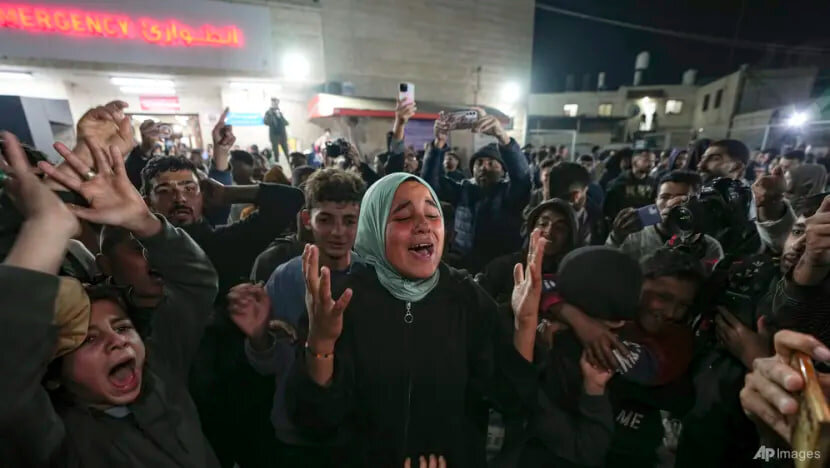Regional reactions to Gaza ceasefire

TEHRAN – Reactions from across the region to the Gaza ceasefire agreement have been coming in. Here are some highlights.
Yemen
Ansarallah leader Sayyed Abdul-Malik al-Houthi affirmed that the stance of the Yemeni Armed Forces is aligned with that of the Palestinian factions and will remain supportive during the implementation phase.
In a televised speech, Sayyed al-Houthi stressed that Yemeni military operations will continue to support the Palestinian people if the Israeli enemy persists in its genocidal massacres and escalation.
He added, "We will continue to monitor the stages of implementing the agreement, and if Israel retreats, commits massacres, or imposes a siege, we will be ready for immediate military support.”
He pointed out that the announcement of the ceasefire agreement in Gaza is a significant development, noting that Israel, along with the U.S., was forced to accept the agreement after months of horrific crimes.
Regarding Yemen’s support front, Sayyed al-Houthi noted its unprecedented global impact. He stated, “No one expected Yemen’s stance to emerge at this level of effectiveness and influence through naval operations and strikes deep within occupied Palestine.”
He noted Yemeni Armed Forces operations involving 1,255 ballistic, cruise, and hypersonic missiles, as well as drones and naval vessels.
Al-Houthi affirmed that the U.S. moved towards an agreement after significant setbacks and failures, realizing there was no path forward for its war on Gaza. He added that the mass killing of Palestinian civilians, children, women, and the elderly is a crime, not a military success, underscoring that the resilience demonstrated in this war signals hope for the Palestinian people’s future.
On Friday, Yemenis held over 140 marches in different provinces in solidarity with Gaza and in support of Yemeni military operations aiding the Palestinian people.
LEBANON
Hezbollah-affiliated media saluted Gaza and its martyr Secretary-General Sayyed Hassan Nasrallah.
Hezbollah-allied cleric Sayyed Ali Fadlallah congratulated “the Palestinian people on the achievement of reaching a ceasefire agreement and recovering its prisoners, which allows for stopping the bloodshed and destruction in Gaza, even though the enemy continues to maneuver in its acknowledgment, seeking to gain more advantages and portray itself as the sole decision-maker in the matter.”
In his Friday sermon from the pulpit of the Imamain al-Hassanain Mosque in Harat Hreik, in Beirut’s southern suburbs, Sayyed Fadlallah added, “We believe that this achievement would not have been possible without the legendary resilience of the resistance, along with the military, political, and popular support that made significant sacrifices in support of Palestine. Most importantly, the sacrifices made by the Palestinian people on this path.”
IRAQ
Iraqi Prime Minister Mohammed Shia’ al Sudani, during a trip to the UK, told British media, “The decision to stop the war is not just up to the Israelis; there are other factors that play a part, like the international community. Iraq has been seeking international partners to stop this destructive war, which [Israeli Prime Minister Benjamin] Netanyahu has been trying to lengthen for various reasons, including internal political reasons that interest him. One of which is to embroil the region in an all-out war to give him more time in office.”
“Everyone realizes that this war, this genocidal war, must stop and that efforts should be made, regionally and internationally, to reconstruct Gaza.”
Iraq’s foreign ministry said it “welcomes the ceasefire agreement in Gaza, which came after great sacrifices and great suffering of the Palestinian people.”
In a statement, the ministry also called “for the need to immediately allow the delivery of humanitarian assistance to the Gaza Strip and the affected Palestinian territories, and to meet the basic needs of the Palestinian people.”
The ministry also stressed "the need to intensify international efforts to rebuild the areas that were destroyed by the aggression, in a way that ensures the return of life to normal and improves the living conditions of the population.”
Meanwhile, the Iraqi Nujaba movement (a faction of the Islamic Resistance in Iraq) announced the suspension of its military operations against the Israeli occupation.
The movement's Secretary-General, Sheikh Akram al-Kaabi, said, “We congratulate the Palestinian people and the free people of the world on this significant development and announce that we will suspend our military operations against the Zionist entity in solidarity with the ceasefire in Palestine and to strengthen the continuation of the truce in Gaza. However, the usurping entity should know that any foolish act in Palestine or the region will be met with a harsh response.”
Al-Kaabi added, “Our fingers remain on the trigger, and our missiles and drones are fully ready. If they return, we will return, and victory will be for the steadfast, struggling believers.”
QATAR & EGYPT
Both countries played a key role as mediators.
The Qatari Emir, Sheikh Tamim Bin Hamad Al Thani, said, “We hope that the announcement of a ceasefire agreement in Gaza will contribute to ending the aggression, destruction, and killing in the strip and the occupied Palestinian territories, and to start a new phase in which this just cause will not be marginalized.”
In a social media post, Egyptian President Abdel Fattah el-Sisi welcomed the Gaza ceasefire deal and stressed the importance of the fast delivery of humanitarian aid to Gaza.
SAUDI ARABIA
The Kingdom’s foreign ministry welcomed the deal and urged commitment “to the deal to end the Israeli aggression on Gaza and the complete withdrawal of Israeli forces from the strip and all Palestinian and Arab lands… It also affirms the importance of building on this deal to resolve the basis of the conflict.”
